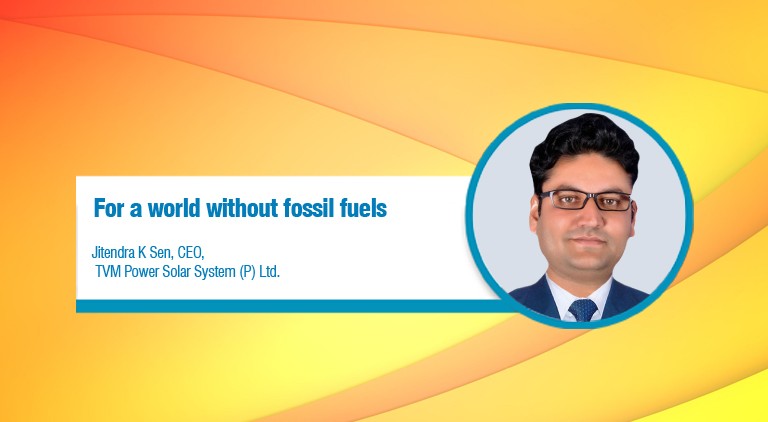For a world without fossil fuels
By EPR Magazine Editorial May 10, 2019 5:21 pm IST
By EPR Magazine Editorial May 10, 2019 5:21 pm IST

We have proposed to build a Solar Park in Rajasthan to meet the demand of power in the state; protecting the environment and minimising the effects of greenhouse gases.
– Jitendra K Sen, CEO, TVM Power Solar System (P) Ltd.
TVM Power’s vision is to develop, build and operate group captive solar power parks with a focus on SME to realise their dream of developing solar power generation at an optimum cost and maximising benefit, says Jitendra K Sen, CEO, TVM Power Solar System (P) Ltd, in an interaction with EPR Magazine.
Please walk us through TVM Power’s journey till date as a company?
TVM Power Solar System (P) Limited is an entrepreneurial driven fast emerging group with interests in green energy. TVM Power has taken a bold initiative to harness the divine solar energy on a large scale to meet the ever growing demand of the energy needs. As a sequel to its green initiative, TVM Power has proposed to build a Solar Park in Rajasthan to meet the demand of power in the state, at least to some extent, thereby protecting the environment and minimising the effects of greenhouse gases.
Tell us about your flagship product and how it could potentially benefit the solar industry.
TVM look forward with Each House–Power House concept! We have micro/mini grid for village electrification. Microgrids are modern, small-scale versions of the centralised electricity system. They are very effective for achievement of community-level electrification in remote areas, using renewable energy sources and have a low carbon footprint. Microgrids generate, distribute, and regulate the flow of electricity to consumers locally.
Please walk us through the motive behind introducing TVM Solar Park project, and how it could benefit the SMEs?
TVM Solar Park, Tonk District, Rajasthan, is under development. It will be an integrated solar park with state-of-art infrastructure over 100 acres accommodating 20 MW solar power plants, solar components manufacturing and solar training and research institute. TVM Power’s vision is to develop, build and operate group captive solar power parks with a focus on SME to realise their dream of developing solar power generation at an optimum cost and maximising benefit.
What’s your take on safeguard duties imposed on imports of cells and modules? How would this impact the overall solar sector?
Imposing a 25 per cent Safeguard duty on solar cell from China and Malaysia, will lead to mitigation of serious injury to the domestic industry. It would improve viability of the upstream and downstream industry associated in the base chain of the manufacturing of solar cell/module. It is welcome move in long term perspective. Ultimately, it will prevent complete wipeout of the manufacturing base of the upcoming solar industry in the country and holds the promise for a much stronger manufacturing base in the country.
The second is remote monitoring. The remote monitoring capability of PV plants has advanced significantly during the past decade and can offer insights at an increasingly granular level. Given that most PV plants are unmanned and remotely supervised, remote monitoring improvements offer potentially huge performance and reliability benefits. Choosing the appropriate monitoring level is system- and equipment-specific. The value of increased system output and reduced downtime will need to exceed the associated costs of advanced monitoring and data analysis competence.
The third is computerised maintenance management system. The most important feature in keeping O&M cost to a minimum is through a thorough review of the plant design, construction inspections and establishing adequate commissioning procedures. Commissioning data should establish the performance baseline and be recorded in the computerised maintenance management system (CMMS).
The last would be data acquisition. To achieve a high-performance PV plant, the incorporation of automatic data acquisition and monitoring technology is essential. This allows the yield of the plant to be monitored and compared with calculations made from solar irradiance data to raise warnings daily if there is a shortfall. Faults, then, can be detected and rectified before they have an appreciable effect on production.
What are the various technological advancements being applied in the manufacturing of solar modules?
• Advances in solar cells and modules were made that significantly reduced the cost of solar modules while increasing their reliability and performance.
• A clear, protective laminate (encapsulant) for solar modules that provides electrical, high-temperature, and ultraviolet stability with no discoloration. In short, the new laminate allowed the Sun’s rays (and other environmental elements) to strike the solar module without overheating it and reducing electrical performance.
• An antireflective glass to its module design, resulting in a module with a 223-watt power output and a corresponding 17.9 per cent total-area efficiency.
• A unique manufacturing process for crystalline silicon wafers using a “dual string-ribbon” growth process. One element of the system, a new contact-printing machine, increased throughput by 70 per cent.
• The SPI-Assembler 5000, a machine that assembled and soldered silicon cells into strings, which replaced a step that had formerly been done manually. The machine resulted in a fivefold decrease in module costs.
What is your outlook for 2020?
Our mission is to develop new and renewable energy technologies, their processes, materials, components, sub-systems, products & services at par with international specifications, standards and performance parameters. This is in order to make India, a net foreign exchange earner in the sector of solar energy and deploy such type of indigenously developed manufactured products and services in furtherance of the national goal of energy security. TVM Power’s vision of a world without fossil fuels is already evolving and transforming the way we live.
We use cookies to personalize your experience. By continuing to visit this website you agree to our Terms & Conditions, Privacy Policy and Cookie Policy.